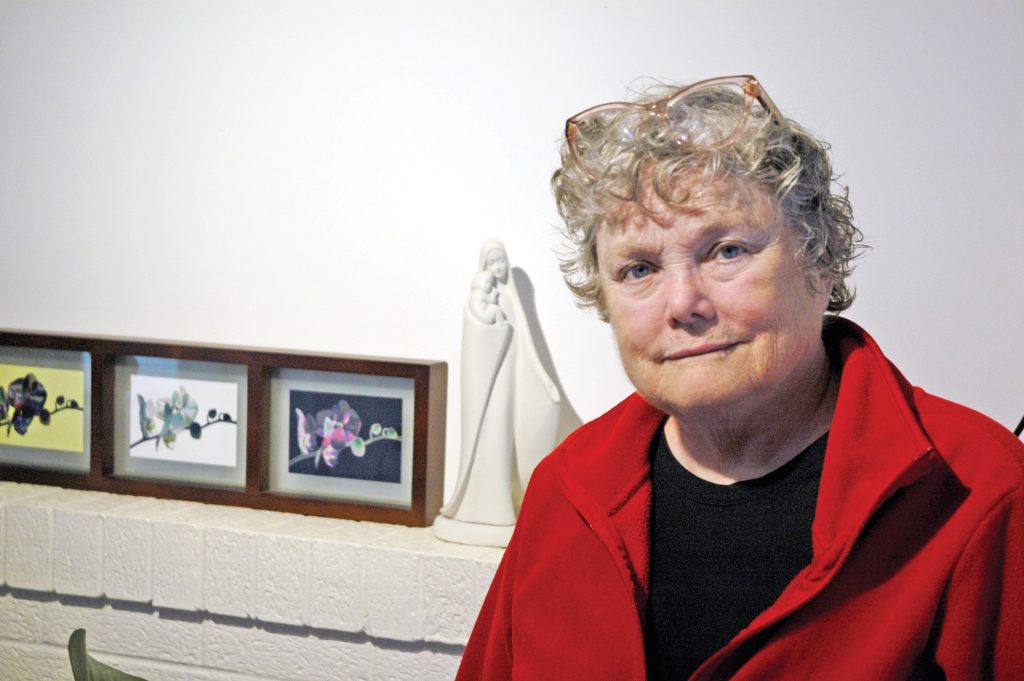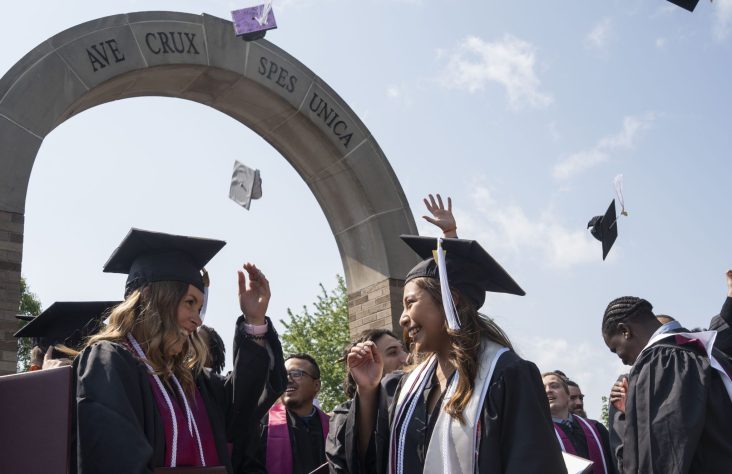February 24, 2023 // National
Woman Enraged by Killing of Relative Comes to Forgive Murderer and Gives Him Proper Funeral
INDIANAPOLIS (OSV News) — When 94-year-old Winnie Harman was raped and stabbed to death by Stephen Todd Booker in Florida 46 years ago, no one could have imagined that such a horrific crime would eventually lead to a remarkable promise made by a relative of Harman’s — Booker would receive a proper funeral when he died.
The promise was fulfilled recently inside a parish church in the Archdiocese of Indianapolis.
Back in 1977, the thought that anything even remotely positive could come out of that tragedy was especially impossible to consider for Page Zyromski, the great-niece of Harman, a woman whom Zyromski loved deeply and viewed as her surrogate grandmother.
When Zyromski learned in a phone call that Harman had been brutally murdered on Nov. 9, 1977, the then-young mother was so overwhelmed by wave after wave of shock and sorrow that her three small children rushed to hug and comfort their mom.

Page Zyromski poses for a photo in her north side Indianapolis home Jan. 20, 2023, after the Immaculate Heart of Mary parishioner shared her story of eventually forgiving the man who murdered her great-aunt 46 years ago. On Jan. 16 at her parish church, she fulfilled her promise to provide him a proper funeral. Stephen Todd Booker spent 45 years on death in Florida before he died at age 69. Zyromski arranged with the Florida prison system to claim his remains, which were cremated. (OSV News photo/John Shaughnessy, The Criterion)
In the days that followed, a feeling of rage also consumed her.
“I had never been that enraged,” she recalled. “I hated that feeling in myself, but I really understood how the family members of a murder victim say, ‘I want to pull the switch.’”
Yet on Jan. 16 of this year, with that rage long ago faded and replaced by a feeling of peace, the 80-year-old Zyromski walked up the aisle of Immaculate Heart of Mary Church in Indianapolis to sit with her husband, two of their children, and their six grandchildren for a funeral Mass for Booker that Zyromski had requested and planned.
As she looked at the vessel filled with Booker’s cremated remains, she recalled the letters and visits that connected her to him for 45 years, the friendship they eventually formed, and the promise she made to give him a decent burial.
She also thought of Harman, the woman who had taught her so much about love, the woman she believed “had the best seat in the house” for this Mass. And mostly, she remembered how God had challenged her to forgive Booker.
In a conversation in her home a few days after Booker’s funeral, Zyromski recalled the sorrow and rage she felt during the funeral services for her great-aunt in 1977.
“An Episcopal priest buried her,” Zyromski said. “One thing he said was, ‘One day, at the eternal banquet, we and Stephen Booker and she would all be enjoying the heavenly communion together.’ I hadn’t forgiven him yet.” Her thoughts mostly focused on Harman.
Zyromski’s mom, Mary, lost her mother when she was 8-years-old. So, Harman raised her. And when Zyromski’s mom had her eight children, Harman became a surrogate grandmother to them.
Growing up, Zyromski spent holidays and summer vacations with Harman and her husband, Frank, a couple who didn’t have children. Her great-aunt was a Sunday school teacher when she was younger, she played bridge to keep her mind sharp, and she watched professional wrestling on television because “the theater and the drama of it” made her laugh.
“When she retired, she moved to Gainesville, Florida, to be with us,” Zyromski told The Criterion, newspaper of the Archdiocese of Indianapolis. “I had my driver’s license, and I could squire her around. She and I would go to St. Augustine frequently and play. She stayed independent in her apartment until 94, when she was murdered. We were looking for her to be 100.”
What then-24-year-old Booker did to Harman started as a burglary. “I have all the clippings,” Zyromski said, pointing to a nearby, thick file of newspaper articles about the crime.
“For some reason, the matter of rape was harder for me to forgive than the murder. That’s just unspeakable. It was a hurdle I couldn’t get over. She was 94-years-old. And she was so little. I don’t think she was 5-feet tall. I doubt she was 100 pounds.”
Zyromski said that Booker apparently pulled Harman into her house when she had returned from a bridge luncheon. She was stabbed 14 times with two knives. “Drugs were in the equation” of what he did, she said.
Zyromski also was unsettled by what she believed God was calling her to do: to forgive Booker.
She resisted God’s call at first. “I had a period of time where I could not say the Our Father at all because I could not say, ‘Forgive us our trespasses as we forgive.’ That little word ‘as’ stopped me cold because I did not want God to forgive me as I was not forgiving Stephen Booker. So, I would go to Mass and when we got to the Our Father, I would just clam up.”
Still, she kept hearing God’s voice as she read her Bible. “I felt God was a monkey on my back, and I hollered at God, ‘Can’t you leave me alone for at least a month to mourn?!’ God gave me almost exactly a month to mourn after this. Then I felt the monkey on my back again. … I kept getting nagged by God to do this,” she said.
Finally, Zyromski relented, writing a letter to Booker, who was on death row in a Florida prison. She shared details about Harman’s life, what her great-aunt meant to her and a few comments about Christian forgiveness.
Booker sent a letter back to her immediately. From then on, they wrote weekly to each other for 45 years before he died at age 69.
Through those letters and the six or so visits that she made to him on death row, she learned details of his life, including his youth in Brooklyn, New York. “He was a Christian. He was raised a Baptist. When he was younger and still in school, he won a prize for French. His mother died when he was 15. He dropped out of high school. He hit the streets. He did drugs. He lied to get into the Army. And he did a lot of bad things.”
Three times he was scheduled for execution and spared. Zyromski said Booker told her that “he did not want to be buried in ‘the yard’ — the prison cemetery as the prisoners call it.”
He had no family to claim his body, so “I made the promise to bury him,” she said. After Booker died on death row, Zyromski arranged with the Florida prison system to claim his remains. She also began making plans for a funeral Mass for Booker, whom she had come to view as a friend.
She relied upon Father Robert Sims, the pastor of Immaculate Heart of Mary Parish, to give a fitting homily. In his 51 years as a priest, Father Sims has never had a request like the one that Zyromski had made of him — to celebrate a Mass and share a homily for someone who had spent most of his life on death row.
Father Sims thought about how “very touching” and “generous” Zyromski’s efforts were toward Booker.
So, he shaped his homily around a story of generosity from World War II that has always touched him: about a Russian woman giving a starving German soldier some bread as he and his fellow soldiers were paraded through town, after Germany eventually lost the Battle of Stalingrad to Russia. As townspeople booed, hissed, and spat at the soldiers, this woman gave one some bread. Moved by her generosity, other women reached into their baskets of bread and did likewise.
Zyromski was modeling that great challenge of generosity and forgiveness “for all of us, in terms of dealing with whoever in our life we need to forgive,” Father Sims said, but he added, “It’s an act of will. We just don’t snap our fingers and forgive somebody. We really need to work at it. It’s a process.”
For Zyromski, forgiving someone doesn’t mean forgetting what someone has done, especially when it has caused tremendous suffering. While she forgave Booker long ago, she has not forgotten the horror of his crime toward a woman she loved dearly.
“I think what I did is expected of any Catholic Christian,” she said. “If I can get one other person to think about forgiving, it will be good.”
John Shaughnessy is Assistant Editor at The Criterion, newspaper of the Archdiocese of Indianapolis.
The best news. Delivered to your inbox.
Subscribe to our mailing list today.






